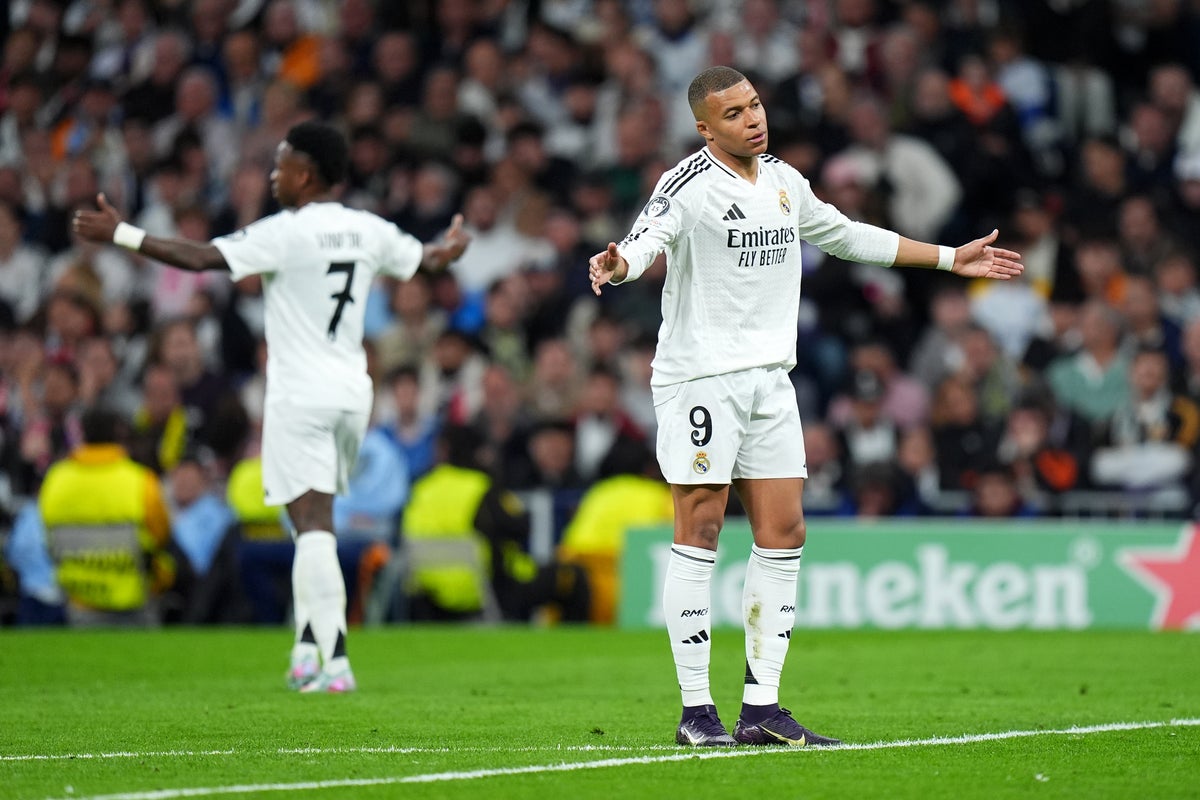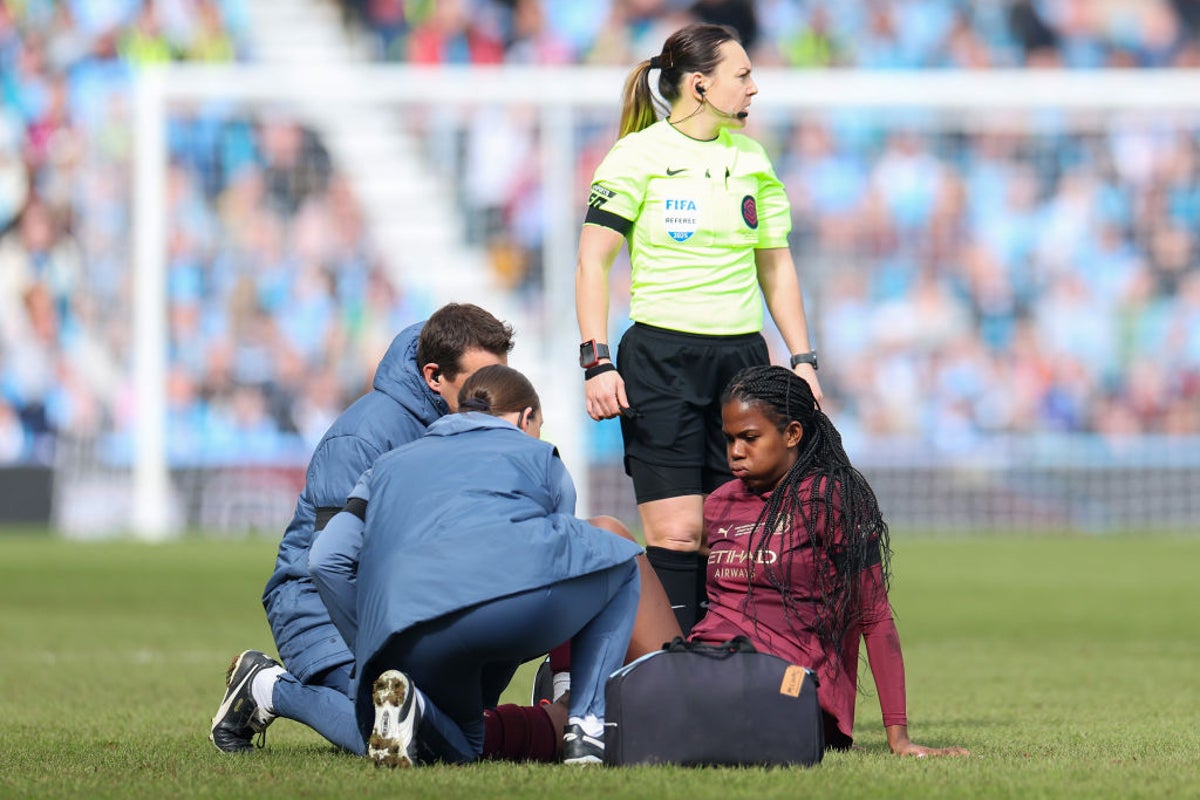
Amid all the recriminations within Real Madrid, and some “ruthless” words in the Bernabeu dressing room, there were also some surprising words from Thibaut Courtois. The goalkeeper had been one of the few players who had performed to standard in the Arsenal elimination, so he could speak with authority. But few expected this.
“We put in a lot of crosses, but this year we didn’t have a Joselu, a natural striker.”
So, in “year one” of Kylian Mbappe, as the local media put it about one of the most expensive players in history, what Real Madrid were actually missing was a 35-year-old journeyman emergency signing in his position.
There’s obviously a bit more to it: Courtois himself is well aware of that, given he also spoke about how “you have to be self-critical and look at everything”.
“I feel we are a team but we must have more team plays and not everything individual,” the goalkeeper continued.
Or, as the line went in Madrid, there was one thing missing from all the “ambiente de remontada”. Amid all the talk of a famous comeback, what was missing was the actual football.
Madrid had to keep playing crosses, and unimaginatively going out wide, because they didn’t have those players capable of doing more. They didn’t have creativity, imagination or simply direction. Arsenal were easily able to withstand it all, because Madrid couldn’t really build anything.
It wouldn’t be the first time that the club’s football project has got lost among other elements in the Florentino Perez era. Many have long attempted to impose on the veteran president the importance of how the delicate chemistry of a team actually works, but he has never really got it. His football understanding has always been described as “superficial”.
So it was in the summer, which represented a classic case of someone being unable to escape their nature, of history repeating itself.
Over the previous five years, Perez had empowered chief scout Juni Calafat to maximise an evident aptitude for team-building. The Brazilian put a plan in place, that involved careful and patient selection of exactly the right players, usually based on young potential. It led to the rebirth of the club, a rise all the more impressive given that the change in strategy had come out of desperation that Madrid could no longer keep up any more.
And into this plan they dropped a player they didn’t need, with Mbappe. It was written on these pages as long ago as November that the French star represented a modern equivalent of Perez insisting on David Beckham in 2003: another signing that wasn’t necessarily motivated by pure football.
Perez had essentially become emboldened by Madrid’s return to Champions League glory, so couldn’t help regressing to what he knows best and wants most: stars. The word for this in Spanish is “ilusion”, which is excitement from spectacle, but Perez has never really understood that true “ilusion” in football actually comes from the play you produce. It’s why Calafat’s investment in youth made such sense, even if it felt like it went against Madrid’s sense of self. Perez remembered what he was, and forgot what the team is.
There’s almost a morality play element.
None of this is hindsight either. It was being said by people close to the very top of the club last season, right up to the eve of the victorious Champions League final win over Borussia Dortmund. Many maintained there was no obvious place for Mbappe in the team, but that was accompanied by a common line. “Our president, he can get this star, so he wants him.”
Mbappe’s first season has now resulted in Madrid going from European champions to going out in the quarter-finals, the French star not even finishing the game.
There is also a basic logic. Madrid had one of the best left forwards in the world in Vinicius Junior, but really needed to replace one of the best midfielders in the world, in Toni Kroos. Calafat had previously been obsessed with this succession plan, putting a lot of thought into which young talents were right to replace the club’s totems like Benzema and Kroos.
That instead went out the window, as another left forward was signed in Mbappe, and that central role went empty. Hence Wednesday’s absurd performance, where Madrid kept trying to just get the ball to their fast players, without having the sophistication to actually direct them properly, to maximise that ability.
The need to accommodate Mbappe has meant so many players being moved out of their best positions, to make the team disjointed and messy. Despite the forward’s obvious talent, the change has made Madrid’s best players worse, rather than enhancing them. It is so similar to replacing Claude Makelele with Beckham, and almost a needless act of tactical self-sabotage that anyone could see coming.
The temptation here is to singularly criticise Mbappe, especially amid the recent farce of his lawyers last week staging a press conference about his legal row with PSG.
The Qatar-owned club have almost been laughing at how they have gone to a new level without him, and it would be another irony if the Qatar-owned club won the Champions League and Madrid lose it just as he switches. That hasn’t been seen since Zlatan Ibrahimovic left 2008-09 Internazionale for 2009-10 Barcelona.
This is really about something deeper with Madrid, though. Given the obvious absence of Kroos, and the aging of Luka Modric, there is also a wider perspective.
Madrid started winning Champions League again with the signing of Modric in 2013-14 and may now stop now he is going. No one imposes that gameplan any more. If a tactical sophisticate like Xabi Alonso does come in as manager, his biggest job might be pushing back against club culture.
Amid all that, there has been this debate about how the stars don’t move enough. Much has been made about how Arsenal outran Madrid in both legs, and that despite two totally different approaches. In the first leg, they dominated possession and ran 12.7km more. On Wednesday, they ceded possession and ran 8.5km more.
That isn’t new either. By November, one senior player was complaining to friends – and anyone who would listen – that the forward line does not run enough. Mbappe and Vinicius have run the lowest number of kilometres per 90 for forwards in the Champions League this season, at 4.97km and 5.47km, respectively. It’s fine if you have one. Two is a problem against modern pressing systems. Another telling moment came on Wednesday when Jude Bellingham stood watching Martin Odegaard glide past him.
While those close to the squad insist the mentality is good, there are clearly grounds for grudges and splits. Again, it’s that delicate team chemistry.
And now Trent Alexander-Arnold is to be dropped into this, potentially taking abrasive club legend Dani Carvajal’s place. Typical compromises may see Alexander-Arnold moved into the centre, which might make a certain sense. He has that ability for imaginative passes they missed against Arsenal. There is still a difference between that and actually running a game.
It comes back to the football. It always does. Madrid should know that better than anyone. Perez, evidently, still hasn’t realised.
Source: independent.co.uk


